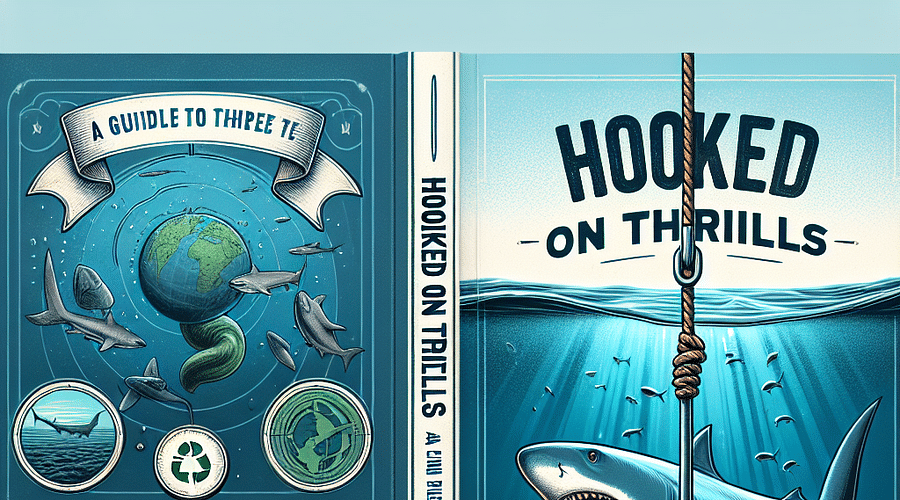Hooked on Thrills: A Guide to Shark Fishing Regulations and Conservation Efforts

Imagine the tug on the line, the splash of the water, and the thrill of reeling in one of the ocean's apex predators. Yes, we're talking about shark fishing, a pastime that combines skill, patience, and respect for marine life. But before you set sail on your next big adventure, it's crucial to be well-versed in shark fishing regulations and conservation efforts. After all, these magnificent creatures are not only vital to our oceans' ecosystems but also to our sense of wonder during Shark Week!
Fishing for sharks is regulated for good reason. Overfishing has led to a decline in many shark populations worldwide. To ensure that future generations can continue to enjoy both watching and responsibly catching these sea giants, various international and regional bodies have put forth guidelines that every angler should know.
For instance, in the United States, the National Oceanic and Atmospheric Administration (NOAA) enforces regulations that cover everything from which species can be legally caught to how they must be handled once on board. It's not just about obeying the law; it's about protecting sharks from overexploitation. Whether you're a seasoned fisherman or new to the game, understanding these rules is essential for a sustainable hobby.
Shark conservation is a hot topic during Shark Week and beyond. Organizations around the globe are working tirelessly to safeguard shark populations through research, education, and policy-making. By supporting their efforts, anglers can contribute to a healthier ocean.










Beyond organizations, individual actions count too. Practicing catch-and-release fishing or using non-lethal gear minimizes harm to sharks. Moreover, spreading awareness about the importance of sharks in marine ecosystems can inspire others to act responsibly. Every effort matters when it comes to conservation.
Shark populations worldwide are facing threats from overfishing and habitat loss. As anglers, we can play a role in their conservation. What practices do you follow to ensure the sustainability of shark fishing?
To fish responsibly, one must understand their quarry. Sharks are often misunderstood creatures that play a critical role in maintaining ocean health by keeping prey populations in check. Learning about their behavior and habitats can lead to more ethical fishing practices.
Recommended books or documentaries provide invaluable insights into the lives of sharks that could transform how we approach shark fishing."Knowledge is power when it comes to fishing sustainably; understanding your impact makes all the difference." - Emma Collins
Becoming familiar with different species is also important as some are more vulnerable than others. For example, knowing why sandbar sharks have specific protection measures can help anglers make informed decisions on the water.
Test your knowledge about shark fishing regulations and conservation efforts inspired by Dwayne Johnson's Shark Week Adventure. Are you ready to dive in and learn more about these magnificent creatures and how we can protect them?
In conclusion – well actually – let’s not wrap up just yet! There’s still so much more thrilling information I want to share with you about how we can enjoy shark fishing while ensuring these majestic creatures continue gliding through our oceans for years to come! Stay hooked as we dive deeper into this topic in part two of this guide where we'll explore more on sustainable practices and how each one of us can contribute during Shark Week!
When we talk about fishing regulations, it's crucial to understand why they're in place. Overfishing is a significant threat to shark populations worldwide. These apex predators have slow growth rates, late sexual maturity, and low reproduction rates, making them particularly vulnerable to overexploitation. By adhering to regulations, anglers play a critical role in ensuring that shark species continue to thrive for generations to come. To grasp the full picture, let's dive into some statistics that highlight the precarious situation these magnificent creatures face.
With each fishing line cast and net spread across the ocean's expanse, we must ask ourselves: Are we catching more than what the sea can replenish? The answer often lies in the dwindling numbers that paint a stark reality of our oceans' health.
In response to these challenges, numerous conservation efforts have emerged. These range from international treaties like CITES (Convention on International Trade in Endangered Species) to local initiatives aimed at protecting nursery grounds. Shark Week plays an instrumental role by not only raising awareness but also supporting research and conservation projects. Want to get involved? Here are some initiatives you can support during Shark Week and beyond:







Beyond financial support, educating yourself and others about sharks' vital role in marine ecosystems is a powerful conservation tool. Consider exploring recommended books or documentaries during Shark Week for a deep dive into their world.
Catch-and-release fishing has become increasingly popular among anglarians who are hooked on thrills but also conscious about preservation. This practice allows for the excitement of reeling in a shark while ensuring its survival post-capture. It's not just about letting them go; it's about handling them with care, minimizing stress and injury, and using proper gear.
If you're eager to test your skills while being mindful of marine life, why not take our Shark Week Conservation and Responsible Fishing Quiz? It's a fun way to check your knowledge on sustainable practices!
To further encourage responsible fishing during Shark Week, let's explore some tips for those planning their next big catch:
Remember, each action taken towards responsible fishing contributes significantly to the broader mission of shark conservation. If you're looking for more ways to make an impact, discover how you can contribute during Shark Week by visiting this page.
In summary, while the thrill of shark fishing is undeniable, it carries with it a great responsibility towards conservation efforts. Regulations are there not just as legal boundaries but as guidelines for sustainability. By staying informed through resources like Shark Week and actively participating in conservation initiatives, anglers can enjoy their sport without compromising the future of these fascinating marine predators.
If you've found this guide informative and engaging, don't forget to sink your teeth into more content! Take a bite out of our Shark Week and Conservation Quiz, or learn about specific species like the Sandbar Shark by checking out their life habits and conservation status. And remember—every week can be Shark Week when we commit to protecting our ocean's guardians!
Post a comment